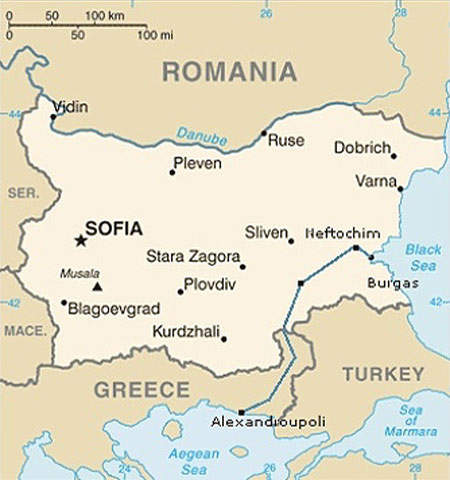
Russia has a reputation as being one of the largest oil producers in the world but does not have such a large number of outlets for the product.
As part of the development of oil transport infrastructure Russia is involved in the financing of a number of trans-European pipelines for both gas and crude oil.
One of the latest projects is the trans-Balkan crude pipeline which will run from Burgas (Black Sea port) in Bulgaria to Alexandropolis in Greece on the Aegean Coast.
The pipeline will run a distance of 285km (175 miles) and will transport more than 750,000bpd of Russian oil, generating more than $600m a month (23 million tons of crude oil a year initially rising to 35 million tons in the second phase and then 50 million in future phases).
The project is estimated to cost around $1.3-1.9bn to construct.
The alternative for Russian oil transport is via tanker through the Bosphorus Strait and the Dardenelles where tankers can often be delayed for up to ten days, which is not good for business due to lost revenue.
Finance and interests in the international pipeline
In March 2007 Russia, Bulgaria and Greece signed an intergovernmental agreement to build and operate the Burgas-Alexandropoulos oil pipeline between Bulgaria and Greece.
The construction is scheduled to begin during 2011-2012. The commissioning and startup are expected in early 2013.
As of December 2011, the environmental and social impact assessment (ESIA) has been completed. The construction will begin upon completion of public hearings.
Advisors to the governments include Allen & Overy and Paul Hastings with stake holders including: Rosneft (17%, Russian), Universal Terminal Burgas (12.25%, Bulgarian), Transneft (17%, Russian), Hellenic Petroleum (8.1%, Greek), Gazprom (17%, Russian), Thraki (8.1%, Greek), Bulgargaz (12.25%, Bulgarian) and the Government of Greece (8.1%). Russia will have overall control of 51% of the line and Greece and Bulgaria will control 49%.
Trans-Balkan pipeline route
The 36in (900mm) line will run from the Black Sea port of Burgas to Alexandropoulos in Greece, passing through several countries including Bulgaria, Macedonia and Albania.
This pipeline (first planned in 1994) is now likely to become the main route to the west for oil and gas being extracted in central Asia.
The project has been planned for some time even before the troubles in some of the former Yugoslavian republics. Now the area is reasonably stable, finance for the project has been forthcoming and the project is a definite possibility (parallels can be drawn with the trans-Alaskan pipeline).
The pipeline will make an important source of crude oil much more accessible. Russia actually provides the EU with one third of its oil and 40% of its natural gas and this will make the supply more secure.
Russia has asked Greece and Bulgaria to secure oil supplies that are proportional to their stakes in the pipeline (24.5% each) if they want to have a say in the new pipeline operating company.
There have been reports that some of the Bulgarian and Greek capacity could be sold to large oil and gas concerns such as Chevron, TNK-BP and KazMunayGas. In addition Kazakhstan has shown an interest in buying a stake in the pipeline.
Scheme details
Russia will control the project’s infrastructure: the pumping stations, warehouses, loading platforms and the docks.
The scheme will see Russian oil shipped across the Black Sea by tanker from Novorossiysk and Tuapse in Russia to the Burgas terminal hub in Bulgaria.
The oil will then be transported via the new pipeline to Alexandroupolis in Greece, where it will then be loaded into Greek tankers for further distribution.
The pipeline will have three oil refilling stations along the route, two of these are intended to be in Bulgaria (the first one is planned at Neftochim quite close to the Burgas terminal) and also one at the Alexandroupolis terminus of the line.
The cost of the project will include the reconstruction and refurbishment (capacity enhancement) of both the Burgas and Alexandroupolis terminals, which will include oil tanks with a capacity of more than 600,000t in Burgas and 1,200,000t in Alexandroupolis.
There have been environmental concerns raised about the possibility of an oil spill in the Aegean where there will soon be a concentration of crude oil tankers.



